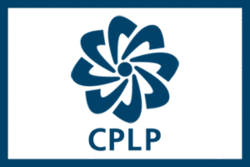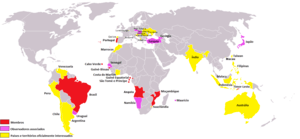Community of Portuguese Language Countries
Comunidade dos Países de Língua Portuguesa Community of Portuguese Language Countries | |
|---|---|
 | |
 A map of member states of the CPLP (red), associate members (magenta), and officially interested parties (yellow) | |
| Headquarters |
Palace of the Counts of Penafiel Lisbon, Portugal 38°42.65′N 9°8.05′W / 38.71083°N 9.13417°W |
| Official language | Portuguese |
| Membership |
9 Member States
19 Associate Observers
|
| Leaders | |
• Executive Secretary |
|
| Establishment | July 17, 1996 |
| Population | |
• Estimate | ~ 266 million |
|
Website www | |
The Community of Portuguese Language Countries (Portuguese: Comunidade dos Países de Língua Portuguesa; abbreviated as CPLP), occasionally known in English as the Lusophone Commonwealth,[1][2] is an intergovernmental organization of Lusophone nations across four continents, where Portuguese is an official language, mostly of former colonies of the Portuguese Empire. The CPLP operates as a privileged multilateral forum for the mutual cooperation of the governments of its members, on both executive and ministerial levels, non-governmental organizations, and the various branches of the CPLP itself.[3]
Formation, objectives and member states
CPLP is a multilateral forum created to deepen mutual friendship and cooperation among its member states.[3]
Through successive enlargements, the Union has grown from the seven founding states—Angola, Brazil, Cape Verde, Guinea-Bissau, Mozambique, Portugal, and São Tomé and Príncipe—to the current nine, with the self-determination of Timor-Leste in 2002[4] and the accession of Equatorial Guinea in 2014[5] at the 10th summit in Dili, Timor-Leste with the issuance of the Dili Declaration.[6] The community is growing from a cultural background to a geopolitical and economic community, as the CPLP is the fourth largest producer of oil in the world and the growing number of larger nations attempting to enter the organization, such as Turkey and Indonesia.[7][8] In 2016, CPLP revised its cooperation protocol in defense, affirming the organization in the promotion of peace and security.[9] In 2017, in Brasilia, the nine member states agreed to enlarge cooperation in matters of the seas, tourism, economy and a more ambitious defense and cooperation mechanisms. More rights to the observer states was also approved, which Argentina planned to join. Easing citizens cross-border movement between the member states was also proposed.[10] This propose by Portugal and Cape Verde towards Brazil was thought by some to collide with Europe's Schengen area. However, this free movement is based in a different model: as residence permits, associated with the recognition of academic degrees and professional qualification, maintenance of social rights including pension systems. It would henceforth establish the Lusophone citizenship, the cidadania lusófona.[11]
The 2017 Exercício Felino Military exercise taking place in Academia Militar das Agulhas Negras, Resende, in the state of Rio de Janeiro, Brazil, aims for the increased interoperability of the armed forces of Angola, Brazil, Capo Verde, Equatorial Guinea, Guinea-Bissau, Mozambique, Portugal, São Tomé and Príncipe, and Timor-Leste. The first phase of the exercise, known as Carta (chart) took place in Cape Verde in 2016, in which the operation was planned and executed using computer networks as a war game. The Exercício Felino was established in the year 2000.[12][13]
CPLP prime objectives are:[3]
- Political and diplomatic cooperation between its member states, in particular to strengthen its presence in the international arena;
- The cooperation in all areas, including education, health, science and technology, defense, agriculture, public administration, communications, justice, public safety, culture, sports and media;
- The materialization of projects for the promotion and dissemination of the Portuguese language.
In 2005, during a meeting in Luanda, the ministers of culture of the member states declared the 5 May as the Lusophone Culture Day (Dia da Cultura Lusófona in Portuguese).[14]
Associate observers
In July 2006, during the Bissau summit, Equatorial Guinea and Mauritius were admitted as Associate Observers[15] along with 17 International associations and organizations considered as Consultative Observers. On 23 July 2014, Equatorial Guinea was admitted as CPLP member.[5]
Mauritius, which was discovered by Portuguese explorers and maintains strong connections with Mozambique, also obtained associate observer status in 2006. In 2008, Senegal, with historical connections to Portuguese colonisation in Casamance, was admitted as Associate Observer.[15]
In July 2014, during the Dili summit, the Heads of State and Government approved a resolution that grants Georgia, Japan, Namibia and Turkey the status of Associate Observers.[5] Japan has had historical contacts with the Portuguese language in the 16th and 17th century, and today has connections to the Lusophone world through Japanese Brazilians in Brazil and Japan. Namibia has had extensive contact to the Lusophone world due to its location just south of Angola.
Three European nations, the Czech Republic, Hungary, and Slovakia, were admitted as observers along with Uruguay at the 2016 summit. Uruguay has historical ties to neighbouring Brazil and has some speakers of Portunol, a Spanish-Portuguese mixture. In January 2018 and prior to the 2018 summit, Italy requested the observer status as effort for the consolidation of bilateral relations with all of the Portuguese-speaking countries. In its request, the Italian government referred that due to the increasing number of associated observers in the community, CPLP is becoming a forum for countries in various geographical regions. Earlier in January, Andorra also formalized its candidacy for the same status.[16] Italy shares a legacy of Ancient Rome and Italy is the non-lusuophone nation with the most number of university chairs in the Portuguese language. Because of immigration and close geographic proximity, Portuguese is one of the most spoken languages in Andorra.[17]
In the 2018 summit with all the heads of state present, with the exception of East Timor due to national policies issues, several observers joined the organization: Luxembourg, Andorra, the United Kingdom of Great Britain and Northern Ireland, Argentina, Serbia, Chile, France, Italy and the Organization of Ibero-American States joined as observers.[18] Uruguay, a observer nation since 2016, admitted in early 2018 a candidacy to become full member of the CPLP.[19]
Significance

The Portuguese-speaking countries are home to 267 million people located across the globe but having a common language, a shared history, and some cultural similarities. The CPLP nations have a combined area of about 10,742,000 square kilometres (4,148,000 sq mi), which is more than twice as large as the European Union 4,475,757 square kilometres (1,728,099 sq mi), but with a little more than half of the population.
Since its formation, the CPLP has helped to solve problems in São Tomé and Príncipe and in Guinea-Bissau, because of coups d'état in those countries. The CPLP helped these two countries to take economic reforms (in the case of São Tomé) and democratic ones (in the case of Guinea-Bissau).
In the early 21st century, the leaders of the CPLP believed that peace in Angola and Mozambique, as well as East Timor's independence, favored the development of the CPLP and a strengthening of multilateral cooperation.
Since many children in rural areas of Lusophone Africa and East Timor are out-of-school youth, the education officials in these regions seek help from Portugal and Brazil to increase the education to spread Portuguese fluency (like establishing Instituto Camões language center branches in main cities and rural towns), as Portuguese is becoming one of the main languages in Southern Africa, where it is also taught in Namibia and South Africa.
In many developing Portuguese-speaking nations, Portuguese is the language of government and commerce which means that Portuguese-speaking people from African nations can work and communicate with others in different parts of the world, especially in Portugal and Brazil, where the economies are stronger. Many leaders of Portuguese-speaking nations in Africa are fearful that language standards do not meet the fluency required and are therefore making it compulsory in schools so that a higher degree of fluency is achieved and young Africans will be able to speak a world language that will help them later in life.
Angola has not yet signed the most recent accord on the orthography of the Portuguese language, and has asked other PALOP countries to support it in discussions on various points of that accord with Portugal.[20]
Governance
The Organization’s Executive Secretariat is responsible for designing and implementing the CPLP's projects and initiatives. It is located in Lisbon, Portugal. The Executive Secretary has a two-year mandate, and can be re-elected once.[21]
The CPLP's guidelines and priorities are established by a biannual (or whenever requested by 2/3 of the member states) Conference of Heads of State and Government[22] and the Organization’s plan of action is approved by the Council of Foreign Ministers,[23] which meets every year. There are also monthly meetings of the Permanent Steering Committee that follow specific initiatives and projects.
The CPLP is financed by its member states.[3]
| Name | Took office | Left office | Country |
|---|---|---|---|
| Marcolino Moco | 17 July 1996 | July 2000 | |
| Dulce Maria Pereira | July 2000 | 1 August 2002 | |
| João Augusto de Médicis | 1 August 2002 | April 2004 | |
| Zeferino Martins (interim) | April 2004 | July 2004 | |
| Luís de Matos Monteiro da Fonseca | July 2004 | July 2008 | |
| Domingos Simões Pereira | 25 July 2008 | 20 July 2012 | |
| Murade Isaac Murargy | 20 July 2012 | 9 January 2017 | |
| Maria do Carmo Silveira | 9 January 2017 | present |
| Summit | Host country | Host city | Year |
|---|---|---|---|
| I | Lisbon | 1996 | |
| II | Praia | 1998 | |
| III | Maputo | 2000 | |
| IV | Brasília | 2002 | |
| V | São Tomé | 2004 | |
| VI | Bissau | 2006 | |
| VII | Lisbon | 2008 | |
| VIII | Luanda | 2010 | |
| IX | Maputo | 2012 | |
| X | Dili | 2014 | |
| XI | Brasília | 2016 |
Consultative observers
Besides Associate Observer states, the CPLP also engages civil society organizations as Consultative Observers from various CPLP and from regions of non-CPLP countries (Spain and China), as well as pan-Lusophone bodies.[25]
| Country | Consultative observers |
|---|---|
| |
| |
| |
| |
| |
| |
|
Macau accession
Macau was the last Portuguese overseas territory to be decolonized, and returned to China in 1999. It still retains traces of the Portuguese culture and Portuguese is one of the official languages of the territory. Despite that, the majority of the population in Macau do not speak and understand Portuguese. Cantonese language is the main language. In 2006, during the II Ministerial meeting between China and Portuguese Speaking Countries, the CPLP Executive Secretary and Deputy ambassador Tadeu Soares invited the Chief Executive of the Government of the Macau Special Administrative Region, Edmund Ho Hau Wa, to request the Associate Observer status for Macau. The Government of Macau has not yet formalized this request.
Equatorial Guinea
When the CPLP was formed, Equatorial Guinea asked for observer status. Equatorial Guinea (Portuguese: Guiné Equatorial) was a Portuguese colony from the 15th to 18th centuries and has some territories where Portuguese-based creole languages are spoken and cultural connections with São Tomé and Príncipe and Portugal are felt. Also, the country has recently cooperated with Portuguese-speaking African countries and Brazil at an educational level. At the CPLP summit of July 2004, in São Tomé and Príncipe, the member states agreed to change the statutes of the community to accept states as associate observers. Equatorial Guinea then engaged in discussion for full membership.[26] In June 2010, Equatorial Guinea asked to be admitted as full member. At its 8th summit in Luanda in July 2010, the CPLP decided to open formal negotiations with Equatorial Guinea about full membership in the CPLP.[27] At its 10th summit in Dili in July 2014, Equatorial Guinea was admitted as CPLP member.[5]
See also

- Lusophone music
- CPLP Games
- Lusophony Games
- TV CPLP
- Flag of the Community of Portuguese Language Countries
- Lusitanic
- Organisation internationale de la Francophonie
- Francophonie
- Commonwealth of Nations
- Latin Union
- Hispanidad
- Portuguese Empire
- Geographic distribution of the Portuguese language
- Portuguese-speaking African countries (PALOP)
- List of countries where Portuguese is an official language
- List of international organisations which have Portuguese as an official language
- Three Linguistic Spaces
References
- ↑ IBFD International Tax Glossary
- ↑ Africa South of the Sahara 2003
- 1 2 3 4 "CPLP Objectivos" (in Portuguese). CPLP. Retrieved 23 July 2014.
- ↑ "DECLARAÇÃO SOBRE A ACEITAÇÃO DO PEDIDO DE ADESÃO DA REPÚBLICA DEMOCRÁTICA DE TIMOR-LESTE À CPLP" (PDF) (in Portuguese). CPLP. 1 August 2002. Retrieved 23 July 2014.
- 1 2 3 4 "X Conferência de Chefes de Estado e de Governo da Comunidade dos Países de Língua Portuguesa" (in Portuguese). CPLP. 23 July 2014. Archived from the original on 26 July 2014. Retrieved 23 July 2014.
- ↑ "Angola: CPLP 10th Summit of Dili Ends". allAfrica.com. 2014-07-24. Retrieved 2015-08-11.
- ↑ "CPLP é o quarto maior produtor de petróleo do mundo" (in Portuguese). DW. 22 July 2014. Retrieved 15 December 2014.
- ↑ "António Vitorino diz que dimensão geopolítica explica adesão da Guiné Equatorial à CPLP" (in Portuguese). SIC Notícias. 23 July 2014. Retrieved 15 December 2014.
- ↑ "CPLP: Ministros da Defesa aprovam criação mecanismos de resposta conjunta a situações de catástrofes" (in Portuguese). Expresso das Ilhas. 20 May 2016. Retrieved 22 May 2016.
- ↑ "CPLP quer uma espécie de "vistos gold" para os nove" (in Portuguese). Publico. July 21, 2017. Retrieved July 23, 2017.
- ↑ "Governo diz que liberdade de circulação na CPLP não colide com Schengen" (in Portuguese). Publico. Retrieved July 23, 2017.
- ↑ "Incidentes em Cenário fictício comporão Exercício Felino, que prepara países da CPLP para emprego conjunto" (in Portuguese). Academia Militar das Agulhas negras. Retrieved September 22, 2017.
- ↑ "Militares de estados da CPLP preparam no Brasil exercício conjunto" (in Portuguese). África 21 Digital. Retrieved September 22, 2017.
- ↑ "Declaração de Luanda - IV Reunião dos Ministros da Cultura da CPLP" (PDF) (in Portuguese). CPLP. 13 May 2005. Retrieved 23 July 2014.
- 1 2 "Observadores Associados" (in Portuguese). CPLP. Retrieved 23 July 2014.
- ↑ "Itália pede estatuto de observador na CPLP" (in Portuguese). DN. 29 January 2018. Retrieved 8 February 2018.
- ↑ "The World factbook - Andorra". CIA. Retrieved 8 February 2018.
- ↑ "Declaração da XII Conferência de Chefes de Estado e de Governo da CPLP". CPLP. Retrieved 24 July 2018.
- ↑ "Uruguai admite apresentar candidatura a Estado-membro da CPLP". Expresso. Retrieved 24 July 2018.
- ↑ "PALOP reunem-se à margem da 20ª Cimeira do Conselho Executivo" [PALOP countries meet at the 20th summit of the UA executive] (in Portuguese). Angop. 28 January 2012. Retrieved 27 March 2012.
- ↑ "CPLP Secretariado Executivo" (in Portuguese). CPLP. Retrieved 23 July 2014.
- 1 2 "CPLP Conferência de Chefes de Estado e de Governo" (in Portuguese). CPLP. Retrieved 23 July 2014.
- ↑ "CPLP Conselho de Ministros" (in Portuguese). CPLP. Retrieved 23 July 2014.
- ↑ "CPLP Anteriores Sec. Executivos" (in Portuguese). CPLP. Retrieved 23 July 2014.
- ↑ Comunidade dos Países de Língua Portuguesa. "Lista completa dos Observadores Consultivos" (in Portuguese). Retrieved 20 February 2010.
- ↑ CPLP discusses Equatorial Guinea's membership - People's Daily Online. English.people.com.cn (2008-07-26). Retrieved on 2013-08-09.
- ↑ "Nota informativa: Missão da CPLP à Guiné Equatorial" (in Portuguese). CPLP. 3 May 2011. Retrieved 27 March 2012.
External links
| Wikimedia Commons has media related to Comunidade dos Países de Língua Portuguesa. |
- Official website
- Seminário da CPLP, on the culture and development of the CPLP. (in Portuguese)
- Africanidade, the African countries of the CPLP. (in Portuguese)
- ELO, addressing economic relations between the European Union (EU) and the CPLP.
- UCCLA, Unity of the Capital Cities of Portuguese language.
